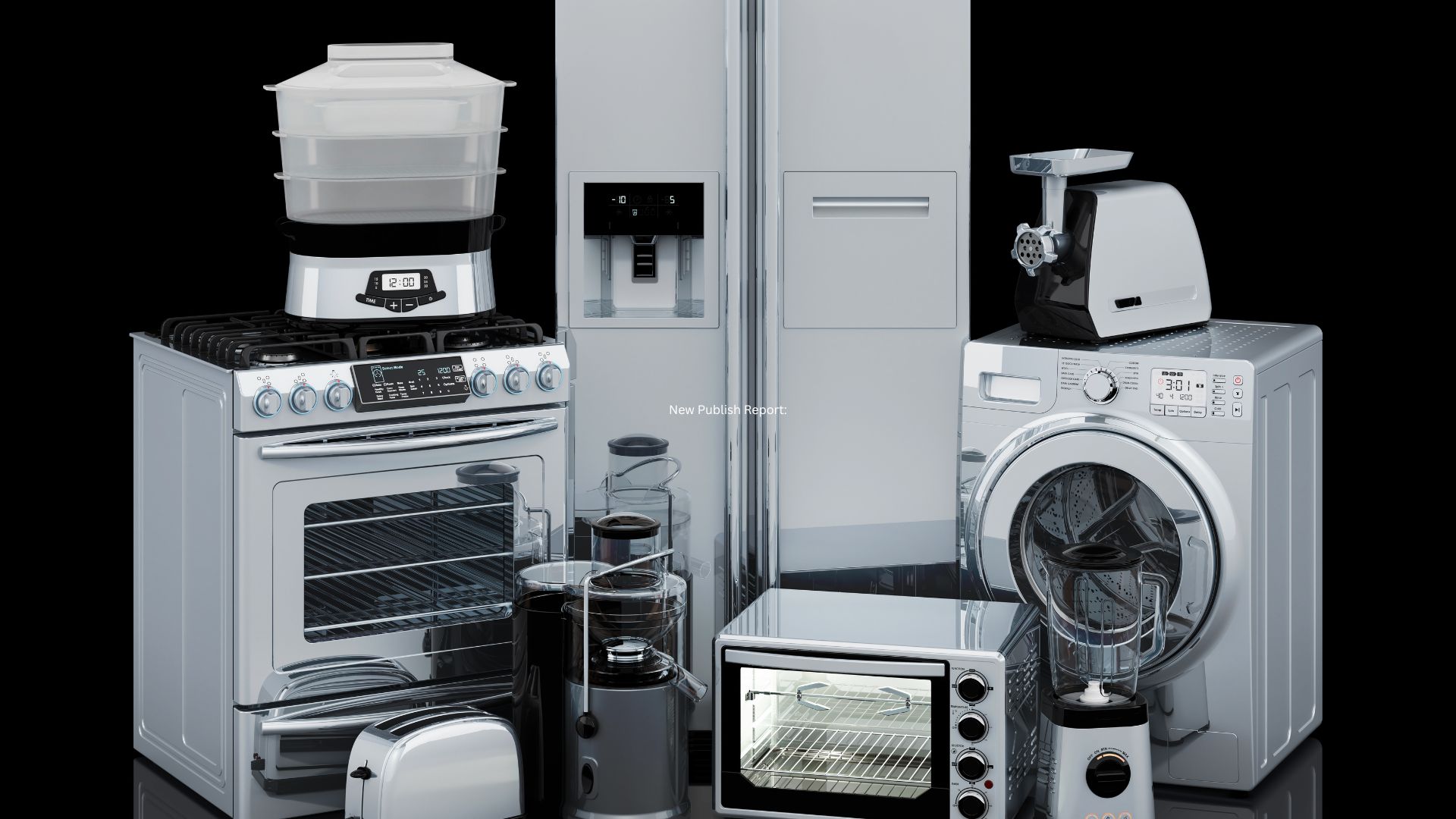Increasing Smart Home Adoption and Energy-Efficient Technologies to Drive Market Growth
According to a recent report by Renub Research, the United States Kitchen Appliances Market is forecast to reach US$ 115.15 Billion by 2033, rising from US$ 74.35 Billion in 2024, and growing at a CAGR of 4.98% from 2025 to 2033. The U.S. market is currently undergoing a significant transformation due to shifting consumer lifestyles, increasing disposable income, and the growing penetration of smart and energy-efficient appliances.
📌 Explore Full Report: United States Kitchen Appliance Market Size & Forecast 2025–2033
Rise in Smart Kitchen Technology Adoption
One of the most prominent trends propelling the U.S. kitchen appliances market is the rising consumer demand for smart appliances. Internet of Things (IoT)-enabled kitchen appliances that offer voice control, remote access, and app integration are increasingly being adopted across American households. Brands are focusing on automation and AI capabilities to deliver appliances that provide convenience, energy savings, and improved user experience.
Devices such as smart refrigerators, AI-powered ovens, and Wi-Fi-enabled dishwashers are growing in popularity. Consumers are also looking for appliances that integrate seamlessly into smart home ecosystems, such as Amazon Alexa or Google Home.
Energy Efficiency and Sustainability Driving Innovation
In addition to smart features, energy efficiency remains a critical driver in the U.S. kitchen appliance industry. With increasing awareness around sustainability and utility cost savings, consumers are favoring Energy Star-rated products that consume less power and water. Manufacturers are responding by investing in green technologies, recyclable materials, and eco-friendly designs.
Government policies and incentives also play a role in encouraging the adoption of energy-efficient appliances. This trend is particularly visible in urban areas, where environmental consciousness and eco-friendly housing practices are more prevalent.
Shifting Consumer Lifestyles Boost Market Demand
The modern lifestyle in the U.S., characterized by fast-paced routines, smaller household sizes, and higher per capita income, has driven the demand for compact, multifunctional, and time-saving appliances. Products such as microwave ovens, air fryers, induction cooktops, and built-in coffee machines are witnessing rising adoption.
Furthermore, the surge in home cooking during and post-COVID-19 has created a permanent behavioral shift. Consumers are now investing more in upgrading their kitchen setups, making it a hub for both functionality and aesthetic appeal. This is further amplified by the growing popularity of open kitchens and modular designs.
E-commerce Channels Amplifying Sales
Online retail has significantly transformed how kitchen appliances are sold in the U.S. A wide selection of products, ease of price comparison, customer reviews, and doorstep delivery options have made e-commerce a preferred channel for both small and major kitchen appliances.
Leading platforms such as Amazon, Walmart, Best Buy, and specialized online electronics retailers are witnessing surging traffic. Manufacturers are also leveraging their own digital platforms to offer product customization, virtual demonstrations, and exclusive online offers.
Segment Analysis: Major Appliances Dominate Revenue Share
In terms of product segmentation, major kitchen appliances such as refrigerators, ovens, and dishwashers account for the largest market share due to their essential role in every household. These are followed by small appliances like blenders, coffee machines, and toasters, which are benefiting from growing consumer interest in gourmet cooking and healthy eating.
Moreover, smart kitchen appliances are the fastest-growing segment due to rising interest in connected home technology.
Regional Insights: Urban Centers and Affluent Suburbs Lead Growth
Metropolitan regions such as New York, Los Angeles, San Francisco, and Chicago remain key growth drivers in the U.S. kitchen appliance market. These areas are home to a large base of tech-savvy and affluent consumers who are early adopters of smart and premium appliances.
Meanwhile, the Southern and Western regions of the United States are showing strong growth due to increasing urbanization, rising household incomes, and expanding housing markets. States like Texas, Florida, and Arizona are seeing a surge in new residential construction, which directly drives demand for kitchen appliance installations.
Competitive Landscape: Innovation is the Key Battleground
The U.S. kitchen appliances market is highly competitive, with key players including Whirlpool, GE Appliances, Samsung, LG Electronics, Bosch, Electrolux, Panasonic, and Haier. These companies are competing on the basis of technology innovation, energy efficiency, pricing strategies, and after-sales service.
Joint ventures, R&D investments, product launches, and strategic partnerships are common strategies used by companies to strengthen their market presence. For instance, LG and Samsung continue to introduce AI-enabled kitchen products with smart diagnostics, voice activation, and personalized cooking assistance.
Key Market Drivers
- Growing Smart Homes Adoption: Integration of kitchen appliances into smart home systems.
- Energy-Efficient Technology: Demand for eco-conscious, low-energy products.
- Changing Consumer Lifestyles: Preference for compact, multi-purpose, and aesthetic appliances.
- E-commerce Penetration: Increasing online sales and direct-to-consumer models.
- Rising Disposable Income: Greater willingness to invest in high-end kitchen solutions.
Challenges Hindering Growth
Despite the growth potential, certain challenges need to be addressed:
- High Cost of Smart Appliances: Price sensitivity in certain demographics.
- Supply Chain Disruptions: Impact of raw material price fluctuations and import tariffs.
- Short Product Life Cycles: Rapid technological changes can make products obsolete.
Future Outlook: Technology, Customization & Integration
As per Renub Research, the future of the U.S. kitchen appliances market lies in customization, connectivity, and sustainability. Consumers will increasingly demand appliances tailored to their cooking habits, dietary needs, and design preferences. Seamless integration across devices and platforms will be vital.
The rise of smart kitchens, combined with trends such as zero-waste living, voice-assisted cooking, and personalized meal planning, is expected to redefine the landscape of kitchen appliances over the next decade.
New Publish Report:
- North America Gluten Free Food Market Size and Share Analysis – Growth Trends and Forecast Report 2025-2033
- North America Biopsy Devices Market – Size, Share, Trends & Forecast 2025-2033
- North America Limestone Market Size and Share Analysis – Growth Trends and Forecast Report 2025-2033
About the Company
Renub Research is a Market Research and Consulting Company with more than 15 years of experience, especially in international Business-to-Business Research, Surveys, and Consulting. We provide a wide range of business research solutions that help companies make better business decisions. We partner with clients across all sectors and regions to identify their highest-value opportunities, address their most critical challenges, and transform their businesses.
Our wide clientele includes key players in Healthcare, Travel & Tourism, Food & Beverages, Power & Energy, Information Technology, Telecom & Internet, Chemicals, Logistics & Automotive, Consumer Goods & Retail, Building & Construction, and Agriculture. Our core team comprises experienced professionals with graduate, postgraduate, and Ph.D. qualifications in Finance, Marketing, Human Resources, Bio-Technology, Medicine, Information Technology, Environmental Science, and more.
Media Contact
Company Name: Renub Research
Contact Person: Rajat Gupta, Marketing Manager
Phone No: +91-120-421-9822 (IND) | +1-478-202-3244 (USA)
Email: rajat@renub.com




